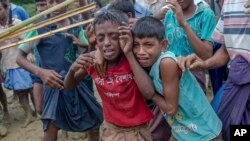The U.N. Children’s Fund warns that more than 320,000 Rohingya refugee children are living in desperate conditions in squalid makeshift settlements in Bangladesh, putting them at risk of disease and vulnerable to exploitation by traffickers.
UNICEF reports that up to 12,000 children a week are fleeing to Bangladesh to escape violence and persecution in Myanmar. In what is the world’s fastest growing refugee crisis, nearly 600,000 Rohingyas have arrived in Cox’s Bazar since the end of August. Almost 60 percent are children.
Heart-breaking report
The UNICEF report graphically describes the fearful existence of these many children. It says they arrive in Bangladesh — painfully thin, malnourished and hungry. After having escaped a near-death experience, the report says the children find themselves living in flimsy shelters. They are reduced to drinking dirty water and having to scrounge for whatever food might be available.
Author and UNICEF senior communications adviser, Simon Ingram, says the chaotic, overcrowded refugee camps are dangerous and challenging for the children.
“People surging in all directions.” he said. “So, for children caught up in that, they are getting lost. … And then in the longer term, it is the sense that these children feel so abandoned. So, completely remote and without a means of finding support or help. And, in a sense, it is no surprise that they must truly see these places as a hell on earth.”
Traumatized children
Ingram said it was particularly painful to see how traumatized the children were from their horrendous experiences in Myanmar.
“Talking to children, hearing their stories and really getting the sense that they had been through something absolutely terrible, absolutely horrific. And, yet, so often the delivery that came across was almost matter of fact. It was almost like they were already shutting it out from their minds,” he said.
UNICEF is calling for an end to the atrocities against civilians in Myanmar’s Rakhine State and for aid agencies to be given unrestricted access to all child victims of violence there.




